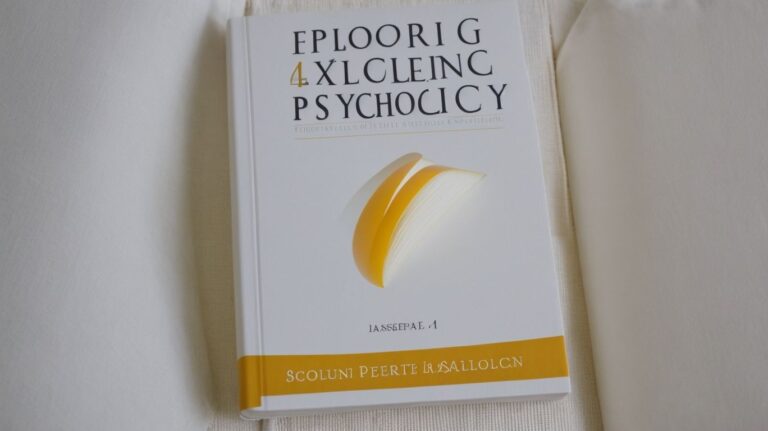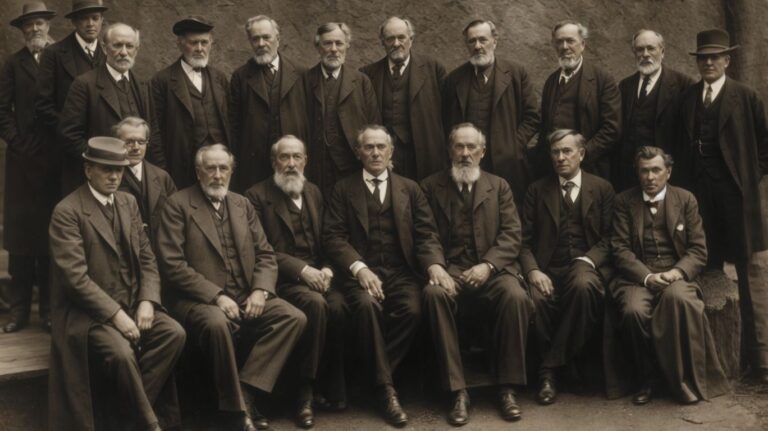Aaron Beck is a prominent figure in the field of psychology, known for his groundbreaking contributions to cognitive therapy and mental health treatment. From the development of cognitive therapy to the creation of the Beck Depression Inventory, Beck’s work has had a profound impact on the way we understand and treat mental health disorders. This article will delve into Beck’s major contributions, how his work has shaped the field of psychology, and the lasting legacy he has left behind for future generations of psychologists.
Contents
- 1 Who is Aaron Beck?
- 2 What are the Major Contributions of Aaron Beck to Psychology?
- 3 How Has Beck’s Work Impacted the Field of Psychology?
- 4 What is the Legacy of Aaron Beck in Psychology?
- 5 Frequently Asked Questions
- 5.1 What are some of the major contributions of Aaron Beck to psychology?
- 5.2 How did Aaron Beck’s work in cognitive therapy impact psychology?
- 5.3 What is the Beck Depression Inventory and how is it used?
- 5.4 How did Aaron Beck’s work challenge traditional psychoanalytic theories?
- 5.5 What makes Aaron Beck’s approach to therapy unique?
- 5.6 What is the lasting impact of Aaron Beck’s contributions to psychology?
Who is Aaron Beck?
Aaron Beck is a renowned psychologist known for his significant contributions to the field of cognitive therapy.
Beck, who graduated from Brown University and Yale Medical School, began his career as a psychiatrist before developing groundbreaking methods in cognitive therapy. Serving as a professor at the University of Pennsylvania, he established the Beck Institute for Cognitive Therapy and Research. His work revolutionized the understanding and treatment of various mental health disorders, emphasizing the role of negative thought patterns and cognitive distortions. Beck’s creation of cognitive therapy techniques, such as cognitive restructuring, has had a profound impact on psychology, influencing numerous therapeutic approaches and helping countless individuals worldwide.
What are the Major Contributions of Aaron Beck to Psychology?
Aaron Beck’s major contributions to psychology include the development of cognitive therapy, the creation of the Beck Depression Inventory, and the introduction of cognitive distortions.
Beck’s pioneering work on cognitive therapy revolutionized the approach to treating various mental health conditions, particularly depression. By emphasizing the role of negative thought patterns and beliefs in shaping emotions and behaviors, Beck’s therapy aimed to challenge and reframe these cognitive distortions to improve psychological well-being.
His groundbreaking research on cognitive distortions, such as magnification, minimization, and all-or-nothing thinking, shed light on the dysfunctional thinking patterns that often underlie depression and anxiety.
The Beck Depression Inventory, a widely used assessment tool, provides clinicians with a standardized way to measure the severity of depressive symptoms, facilitating more accurate diagnosis and treatment planning.
Development of Cognitive Therapy
Aaron Beck revolutionized the field of psychology through the development of cognitive therapy, which focuses on identifying and challenging negative thought patterns, schemas, and automatic thoughts.
One of the core principles of Beck’s cognitive therapy is the idea that our thoughts, beliefs, and interpretations of events can significantly impact our emotions and behaviors. By targeting and modifying these cognitive distortions, individuals can experience improvements in their mental well-being. Beck’s approach also emphasizes the importance of collaboration between therapist and client in setting specific, achievable goals for treatment.
The Beck Institute for Cognitive Behavior Therapy further promotes research and training in cognitive therapy techniques, ensuring that mental health professionals are equipped to effectively implement these strategies across various mental health conditions. By integrating cognitive restructuring, behavioral activation, and problem-solving techniques, cognitive therapy has proven to be highly effective in addressing anxiety disorders, depression, and many other psychological issues.”
Creation of the Beck Depression Inventory
One of Aaron Beck’s significant contributions was the creation of the Beck Depression Inventory, a widely used diagnostic tool in assessing depression symptoms.
The Beck Depression Inventory, commonly referred to as the BDI, was developed by Aaron Beck in the 1960s and has since become one of the most frequently utilized instruments in measuring the severity of depression.
It consists of a series of questions focusing on mood, pessimism, sense of failure, loss of pleasure, self-dislike, self-criticalness, suicidal thoughts, and changes in sleeping patterns. The **BDI** has significantly influenced the field of mental health assessment by offering a standardized method for clinicians to gauge the level of depression in patients.
Its role in research clinics has been pivotal, aiding researchers in evaluating the effectiveness of various interventions and treatment modalities for depression. The versatility and reliability of the BDI make it an invaluable tool in the realm of depression research and diagnostic testing.
Introduction of Cognitive Distortions
Aaron Beck introduced the concept of cognitive distortions, which are irrational patterns of thinking that contribute to negative thoughts and reinforce core beliefs.
These distortions act as a lens through which individuals interpret events, leading to skewed perceptions and judgments in various situations. They can manifest in forms such as black-and-white thinking, catastrophizing, or personalizing situations. Left unaddressed, cognitive distortions can severely impact mental health, perpetuating anxiety, depression, and low self-esteem.
Understanding and challenging cognitive distortions is a fundamental aspect of Cognitive Behavioral Therapy (CBT), a therapeutic approach developed to help individuals change these maladaptive thought patterns. A qualified cognitive behavior therapist can guide individuals in recognizing and correcting these distortions to promote healthier thought processes and behaviors.
Pioneering Work on the Cognitive Triad
Aaron Beck’s pioneering work on the cognitive triad highlighted the interconnectedness of negative views about the self, the world, and the future in individuals with emotional disorders.
This theory posits that individuals suffering from emotional disorders often perceive themselves, their environment, and upcoming events in a distorted, negative light, leading to a cycle of pessimism and despair. By understanding how these three elements influence and reinforce each other, mental health professionals can gain valuable insight into the root causes of psychological distress.
Beck’s cognitive triad provides a framework that encourages therapists and counselors to not only address surface-level symptoms but to delve deeper into the underlying thought patterns and beliefs that perpetuate emotional disturbances. Through cognitive-behavioral therapy, individuals can learn to identify and challenge these negative interpretations, ultimately reshaping their views and improving overall mental well-being.
Influence on the Field of Cognitive-Behavioral Therapy
Aaron Beck’s influence on the field of Cognitive-Behavioral Therapy has been profound, with applications in psychiatric settings, PTSD treatment, and various mental health disorders.
This form of therapy, developed by Beck in the 1960s, revolves around the interconnectedness of thoughts, emotions, and behaviors. It enables individuals to identify and modify negative thought patterns that contribute to psychological distress. Through structured sessions, patients learn coping strategies, problem-solving techniques, and behavioral interventions to address their issues.
Beck’s methods have shown effectiveness in treating a wide range of conditions, including anxiety, depression, phobias, and eating disorders. Therapists often utilize cognitive restructuring to challenge irrational beliefs and encourage healthier thinking patterns. In the context of PTSD, CBT can help individuals process traumatic events, alleviate symptoms, and enhance overall well-being.
How Has Beck’s Work Impacted the Field of Psychology?
Aaron Beck’s work has significantly impacted the field of psychology by shifting the focus from psychoanalysis to cognitive therapy, advancing mental health treatment, and educating future psychologists.
A key aspect of Beck’s influence lies in his pioneering efforts to challenge the prevailing dominance of psychoanalytic approaches in psychology during the mid-20th century. By emphasizing the role of cognitive processes in shaping human behavior and emotions, Beck revolutionized the understanding and treatment of mental health disorders.
This paradigm shift from unconscious drives to conscious thought patterns paved the way for the development of cognitive therapy as a structured and evidence-based approach to addressing psychological issues.
Beck’s contributions in this realm have had a lasting impact on the field, improving outcomes for individuals struggling with conditions such as depression, anxiety, and personality disorders.
Shift in Focus from Psychoanalysis to Cognitive Therapy
Aaron Beck’s contributions led to a significant shift in focus from psychoanalysis to cognitive therapy, emphasizing the importance of cognitive approaches in understanding and treating mental health issues.
Beck’s groundbreaking work highlighted how our thoughts, beliefs, and perceptions greatly influence our emotions and behaviors, laying the foundation for cognitive therapy as a structured and evidence-based approach. His research revolutionized the field by introducing techniques like cognitive restructuring and behavioral activation, offering tangible tools to reshape negative thought patterns and improve mental well-being.
Increased Understanding of the Role of Thoughts in Mental Health
Beck’s work has enhanced the understanding of the role of thoughts in mental health, with applications in cognitive theory, fact-checking negative thought patterns, and helping chronic pain patients.
The cognitive revolution brought forth by Beck emphasized the significance of cognitive distortions in shaping one’s mental well-being. By introducing the concept of cognitive restructuring, Beck’s approach aimed at challenging and reframing maladaptive thoughts that contribute to psychological distress, paving the way for more effective therapeutic interventions. His research highlighted the intricate relationship between cognitive processes and emotional responses, providing valuable insights into the mechanisms underlying mental health disorders. This cognitive-behavioral approach has proven particularly beneficial in addressing chronic pain conditions, offering patients practical strategies to manage pain perception and enhance their overall quality of life.
Development of Effective Treatment Methods for Mental Health Disorders
Aaron Beck’s work has led to the development of effective treatment methods for mental health disorders, including innovative approaches like cognitive behavioral therapy and tools such as the Beck Hopelessness Scale.
Beck’s pioneering work in the field of psychology has significantly impacted the way we understand and treat depression. His research laid the foundation for cognitive behavioral therapy, a widely used therapeutic approach that focuses on changing negative thought patterns and behaviors. This method has proven to be highly effective in helping individuals manage and overcome depression.
One of the key contributions of Beck is the Beck Hopelessness Scale, an important tool used in cognitive behavioral therapy to assess an individual’s level of hopelessness. This scale helps therapists tailor treatment plans to address specific issues and challenges faced by the patient, leading to more personalized and effective interventions.
Integration of Cognitive Therapy into Other Modalities
Beck’s work has facilitated the integration of cognitive therapy into various modalities, supported by peer-reviewed studies that emphasize challenging core beliefs and creating a cognitive Milieu for therapeutic change.
Dr. Beck’s pioneering research in cognitive therapy has been instrumental in revolutionizing the field of psychology. By demonstrating the effectiveness of approaches that focus on cognitive restructuring and addressing deep-seated beliefs, his work has provided a solid foundation for therapeutic interventions. Peer-reviewed studies have played a crucial role in validating these therapeutic strategies, showcasing how challenging and reshaping core beliefs can lead to profound changes in an individual’s cognitive outlook.
The concept of creating a cognitive Milieu, as advocated by Beck, emphasizes the importance of fostering an environment that nurtures cognitive restructuring and positive change. This holistic approach underscores the significance of integrating cognitive techniques into various therapeutic modalities, ensuring a comprehensive and impactful treatment process.
What is the Legacy of Aaron Beck in Psychology?
Aaron Beck’s legacy in psychology endures through continued research advancements in cognitive therapy, ongoing influence on mental health treatment, and inspiration for future generations of psychologists.
As the Honorary President of the Beck Institute for Cognitive Behavior Therapy, his leadership has guided countless professionals in the field towards a deeper understanding of mental health disorders and effective treatment strategies.
Moreover, his contributions to the Psychopathology Research Unit at the University of Pennsylvania have laid a solid foundation for the study and treatment of depression, anxiety, and personality disorders.
These efforts have not gone unnoticed, with Beck being honored with prestigious awards like the Lasker-DeBakey Clinical Medical Research Award for his groundbreaking work in cognitive therapy.
Continued Research and Advancements in Cognitive Therapy
Aaron Beck’s legacy includes the continued research and advancements in cognitive therapy, supported by organizations like the Academy of Cognitive Therapy and the American Academy of Arts and Sciences.
His profound contributions have significantly influenced the field of psychology, with ongoing studies pushing the boundaries of cognitive therapy effectiveness. Ongoing research continues to investigate the nuances of cognitive distortions and the impact of automatic thoughts on mental health outcomes.
Beck’s affiliations with esteemed organizations such as the Academy of Cognitive Therapy provide a platform for collaboration and knowledge sharing among experts in the field. Recognized for his groundbreaking work, Beck’s legacy has been honored by prestigious institutions like the American Academy of Arts and Sciences, solidifying his place as a luminary in the realm of cognitive psychology.
Ongoing Influence on the Field of Psychology and Mental Health Treatment
Aaron Beck’s influence continues to shape the field of psychology and mental health treatment, addressing challenges such as emotional disorders, eating issues, and substance use problems.
Beck’s groundbreaking cognitive therapy techniques have become integral in treating a wide range of mental health conditions, focusing on changing negative thought patterns that contribute to issues like anxiety and depression. His emphasis on identifying and challenging cognitive distortions has laid the foundation for modern cognitive-behavioral therapy (CBT), a widely used approach in psychotherapy. By encouraging individuals to recognize and alter their maladaptive beliefs, Beck’s methods have shown significant efficacy in providing lasting solutions for individuals struggling with a variety of psychological issues.
Inspiration for Future Generations of Psychologists
Aaron Beck’s work serves as an inspiration for future generations of psychologists, encouraging evidence-based practices, fact-checking, and the application of Beck AT in research and clinical settings.
Beck’s pioneering work in cognitive therapy revolutionized the field of psychology by highlighting the significance of understanding the cognitive processes influencing behavior and emotions. His emphasis on utilizing evidence-based practices has set a high standard for the profession, urging psychologists to rely on empirical data rather than theoretical assumptions. The incorporation of Beck AT in both research and clinical settings allows practitioners to assess and monitor cognitive distortions efficiently, leading to more targeted interventions and improved outcomes.
Frequently Asked Questions
What are some of the major contributions of Aaron Beck to psychology?
Aaron Beck is known for his pioneering work in cognitive therapy, which has greatly influenced the field of psychology. He is also credited with developing the Beck Depression Inventory, a widely used assessment tool for measuring depression.
How did Aaron Beck’s work in cognitive therapy impact psychology?
Aaron Beck’s cognitive therapy approach focused on identifying and changing negative thought patterns and beliefs, which had a significant impact on the field of psychology. It has been used to successfully treat a variety of mental health disorders, including depression, anxiety, and eating disorders.
What is the Beck Depression Inventory and how is it used?
The Beck Depression Inventory (BDI) is a self-report questionnaire that measures the severity of depression symptoms. It consists of 21 items related to symptoms of depression, such as thoughts, feelings, and behaviors. Mental health professionals use the BDI to assess the level of depression in their patients.
How did Aaron Beck’s work challenge traditional psychoanalytic theories?
Aaron Beck’s cognitive therapy approach challenged traditional psychoanalytic theories by emphasizing the role of thoughts and beliefs in shaping emotions and behaviors. This shift in perspective led to a more structured and goal-oriented approach to therapy, which has been shown to be highly effective in treating various mental health issues.
What makes Aaron Beck’s approach to therapy unique?
Aaron Beck’s approach to therapy is unique in its focus on addressing and changing negative thought patterns and beliefs. This differs from traditional psychoanalytic theories, which often focus on exploring past experiences and unconscious motivations. Beck’s approach has been shown to be highly effective in helping individuals overcome a wide range of mental health issues.
What is the lasting impact of Aaron Beck’s contributions to psychology?
Aaron Beck’s contributions to psychology, particularly his work in cognitive therapy, continue to have a lasting impact on the field. His approach has been widely adopted and adapted by therapists around the world, and his research has advanced our understanding of how thoughts and beliefs influence mental health. His work continues to shape the way we approach and treat mental health disorders.




